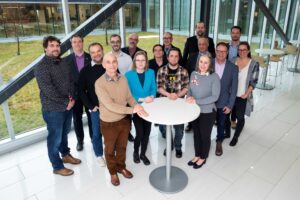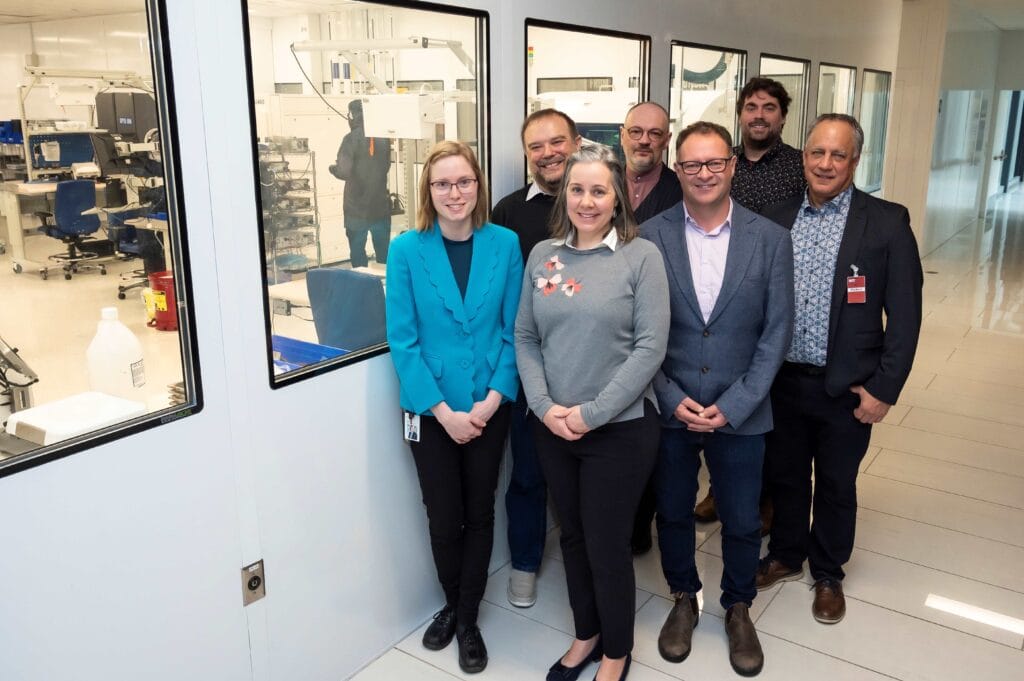Greener and healthier microelectronic assembly materials could soon be on the horizon thanks to a new collaborative research project aimed at supporting and promoting technological advances while incorporating best practices in sustainable development. Researcher Serge Ecoffey, a professor in the Faculty of Engineering and member of the Interdisciplinary Institute for Technological Innovation, is leading this promising project.
With a duration of five years and $2.2 million in funding from the Natural Sciences and Engineering Research Council of Canada (NSERC) Alliance Society program, the project brings together several partners who share the same vision of developing innovative bio-based epoxy resins that will help reduce environmental impacts. The companies that will be collaborating on the various aspects of this innovative project are Aeponyx, BioProFor (11127012 Canada Inc.), C2MI, Exxel Polymers, IBM Canada, Kemitek, and Natural Resources Canada.
“This project was born out of a proposal by Catherine Marsan-Loyer, technical coordinator of eco-responsible projects at C2MI, and has grown since then. It aims to bring together Canadian experts covering the entire value chain, from the raw material, wood, to the end of the product’s life, including the synthesis of epoxy and its use in real microelectronic systems. This makes it possible to fully assess the viability and impact of a material that could be promising for microelectronic assembly, namely a bio-based epoxy resin,” summarizes Serge Ecoffey.

This project aims to provide an attractive alternative to the materials commonly used in the assembly of electronic components, which are largely petroleum-based and can have undesirable or adverse effects on health and the environment.
The research must focus on meeting the strict specifications for microelectronic epoxy resins, but also, and above all, on their performance and reliability when used in microelectronic products or systems.
“The ultimate goal would be to successfully develop resins with performance and reliability suitable for microelectronic applications, so that we could extend the use of these materials to develop other less demanding applications,” says Serge Ecoffey.
Significant societal impact
Three doctoral students will focus in particular on the societal and environmental impact of the technologies and materials associated with the synthesis, use, and end of life of bio-based epoxy resins intended for microelectronic assemblies.
The project also plans to disseminate its findings widely through conferences and scientific journals, as well as through workshops open to experts from related fields outside the current consortium, in order to share the project’s advances in both the materials themselves and life cycle analysis tools.
The co-applicants for the project are: Marie-Luc Arpin, professor at the School of Management, Nathalie Faucheux, David Danovitch, and Ben Amor, professors at the Faculty of Engineering, as well as David Gendron, associate professor at Laval University and researcher at Kemitek.
Engaged partners
“Alliance Program grants are designed to foster collaboration between university researchers and a wide range of partner organizations and companies in the public, private, and non-profit sectors. These grants support research that generates not only new knowledge in the natural sciences and engineering, but also tangible social benefits. This type of collaboration promotes the application of research results in real life, providing Canada with long-term economic, social, and environmental benefits that strengthen its global competitiveness.”
Manal Bahubeshi, Vice-President, Research and Technology Partnerships Directorate, NSERC
“I am proud to see, once again, the University of Sherbrooke’s leadership in sustainable development. Through this project for the more eco-responsible development of microelectronic assembly resins, the University is strengthening the green innovation ecosystem that is developing in Sherbrooke and across the country. This type of project also allows Canada to become more competitive in this field internationally.”
Élisabeth Brière, Parliamentary Secretary to the Minister of Families, Children, and Social Development, Parliamentary Secretary to the Minister of Mental Health and Addictions, Associate Minister of Health, and Member of Parliament for Sherbrooke
“This NSERC Alliance Society project marks an important step forward in the sustainable development of our sector. C2MI and its partners are innovating across the board with bio-based solutions, such as epoxies, that combine performance and environmental responsibility. This initiative reflects our commitment to a greener future and the importance of collaboration between research at all levels and industry for concrete and responsible solutions.”
Marie-Josée Turgeon, President and CEO, C2MI
“As long-standing partners of C2MI and 3IT, we are very pleased to support this project, which will open up a new eco-responsible avenue for microelectronics manufacturing processes.”
Damien Michel, Senior Vice President, Technologies and Products, Aeponyx
“The quality of the stakeholders involved is a guarantee of success for the Alliance research project. Our innovative process for producing bio-based platform molecules from residual forest biomass can provide a high-quality raw material for the production of microelectronic assembly resin while promoting carbon sequestration and GHG reduction. The Alliance project is an excellent opportunity to decarbonize the microelectronics industry and offers a very interesting new market for the forestry industry.”
Marc André Hinse, Eng., President, BioProFor
“This project is perfectly aligned with Kemitek’s mission to develop innovative solutions that respect the principles of green chemistry. With our expertise in the design of bio-based polymers and our unique infrastructure dedicated to cutting-edge research and process control, we will leverage our know-how to contribute to the development of new bio-based epoxy resins. This collaboration demonstrates the importance of partnerships between universities, research centers, and college technology transfer centers (CCTTs) specializing in applied research. We firmly believe that this initiative will play a decisive role in the integration of bio-based solutions, both in the microelectronics sector and in other fields with a variety of applications.”
Alain Tremblay, Acting General Manager, Kemitek
Cover photo: Catherine Marsan-Loyer, C2MI; Serge Ecoffey, UdeS; Katherine Pilger, IBM; Damien Michel, Aeponyx; Hans Fortin, Exxel Polymers; David Gendron, Kemitek; Marc-André Hinse, BioProfor.
SOURCE: Université de Sherbrooke

